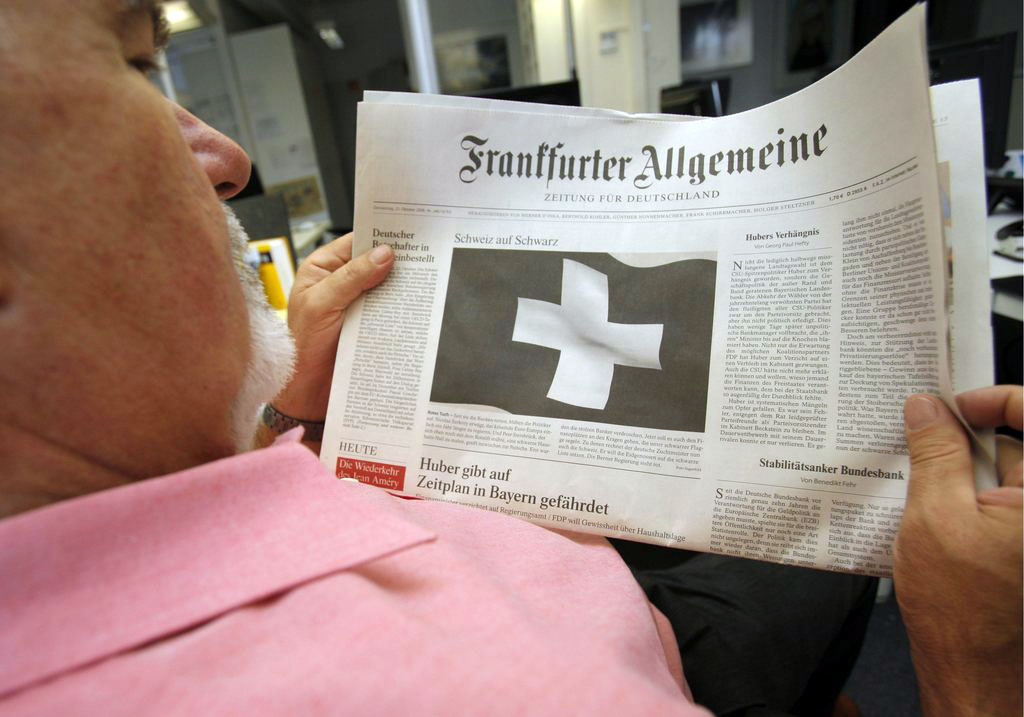
Keeping a positive spin on Switzerland’s image

Cheese and Roger Federer. Tax evasion and minaret bans. Which issues in Switzerland’s social and political discourse resonate abroad and how does the government counter misinformation in the foreign press?
Dedicated to promoting a positive image of Switzerland abroad, Presence Switzerland, has recently begun using state-of-the art technology – developed by a company which created a similar programme for Israeli security agency Mossad – to monitor when, why and by whom Switzerland is mentioned by foreign media outlets.
Nicolas Bideau, head of Presence Switzerland, describes his office as the “government’s communication agency” which he says needs to know “exactly” the positioning of Switzerland in the foreign media. The programme continually monitors more than 100 “classic media” outlets in a sample of 15 countries, as well as social media as necessary.
“If we used classic monitoring to know exactly, day to day, how Switzerland is positioned, we would have thousands of articles which are written about our country, without the actual possibility of reading them. We need something that is more sophisticated than that,” Bideau told swissinfo.ch
Monitoring results from the three months to the end of March 2012 reveal that 41 per cent of foreign media coverage mentioning Switzerland concentrated on the economy, business and finance. A further 16 per cent covered crime and justice, 13 per cent discussed politics and eight per cent sport. Themes including art and culture, health, and social issues ranked in the low single digits.
Following the news trail
Bideau said monitoring of the foreign media, the context and tone in which Switzerland is mentioned, whether it is positive or negative, allows his agency to react if journalists are badly informed, or only presenting one side of the story, for example.
“What is interesting is that we can create models with this programme; we can see where the news is coming from, who does the news, who puts it out, who follows it up, what is the logic, what are the ideas that are covered by the agencies, which are covered internationally,” he said. “So it allows us to understand the mechanics and to use it to correct things.”
Bideau said that in the case of Switzerland’s relationship with the United States, for example, much of the reporting that appeared in international media was done by the Reuters news agency in Zurich and subsequently carried by other media.
“So for me, it’s very important that the journalists who work for Reuters in Zurich should be 100 per cent informed about the position of Switzerland,” he said.
Positive image?
In general, Switzerland has a positive image abroad, says Stefan Feiger, managing director of the marketing agency HTP, which in 2010 collaborated with St Gallen University to conduct a survey of 3,700 people from more than 50 countries to evaluate Switzerland’s image abroad. It was the third time the agency conducted such a survey, and it plans to carry out a fourth in the next six to 12 months.
Conclusions about Switzerland vary from country to country, Feiger told swissinfo.ch, with people from neighbouring countries more likely to draw on personal experiences of Switzerland as compared to people from further afield where media plays a more prominent role in creating their perception of Switzerland.
Bideau said that discussion of Switzerland in Asia for example, tends to focus more on tourism because people there know less about Switzerland. However in Europe, the question of Switzerland’s policies towards the European Union generates much more media interest.
“In Europe, you will have an article about Swiss tourism if there is a particular event, like someone climbing the Eiger, or unfortunately if there are accidents, such as we have seen recently,” said Bideau.
Popular exports
Feiger said that survey results showed that Switzerland’s image abroad is largely formed by popular Swiss products.
“One of the conclusions is that the image of Switzerland is formed by the products that people know of, for example the Swiss army knife is a popular brand on a worldwide scale and products like this along with many other products and services are responsible for the image to a large extent,” Feiger said.
Bideau agreed that high quality export products such as cheese and chocolate contribute greatly to forming a positive view of Switzerland in the eyes of “Mr and Mrs Everybody”, but the image of Switzerland in the media “is another story”.
“In the media there is a pretty negative spin, notably about our so-called problems with taxation, which are linked to the stability of Switzerland in this period of economic crisis,” he said. “And then you have the positions taken by governments which are sometimes tough in countries like Germany, England, the US, and the media love that. They rarely print the good news, they greatly prefer to print the bad news.”
Global moral compass
Notable in the 2010 study, coming as it did just after UBS admitted to helping US clients evade taxes and the highly emotive issue of the initiative to ban minarets in Switzerland, was that these issues did not impact the image of Switzerland in the eyes of survey respondents, said Feiger.
This could be due in part to the fact that Switzerland does not exist in isolation.
“Switzerland is not the only [country] to be [covered] in the press negatively, a couple of other countries have too,” said Feiger. “What we did see in the banking sector was that in general, the image of Swiss banking had gone down a little bit but so had the image of American and Spanish banks, for example.”
But while the immediate problems of one company may not play a huge role in perceptions of Switzerland abroad, the major international issue of dormant holocaust accounts in the 1990s still has implications for Switzerland’s image nearly 20 years later, said Feiger.
“In our interpretation, as soon as there’s a moral dimension in the discussion, it’s much more dangerous for the image of the country. The problems of a single company do not affect the image of the country as a whole when compared with moral discussions like Nazi gold,” he said.
Economy, business, finance: 41%
Crime, law, justice: 16%
Politics: 13%
Sport: 8%
Labour: 4%
Accidents: 4%
Health: 3%
Culture: 3%
Conflicts and war: 3%
Social issues: 2%
Science and technology: 1%
(Source: Presence Switzerland)

In compliance with the JTI standards
More: SWI swissinfo.ch certified by the Journalism Trust Initiative




























You can find an overview of ongoing debates with our journalists here . Please join us!
If you want to start a conversation about a topic raised in this article or want to report factual errors, email us at english@swissinfo.ch.